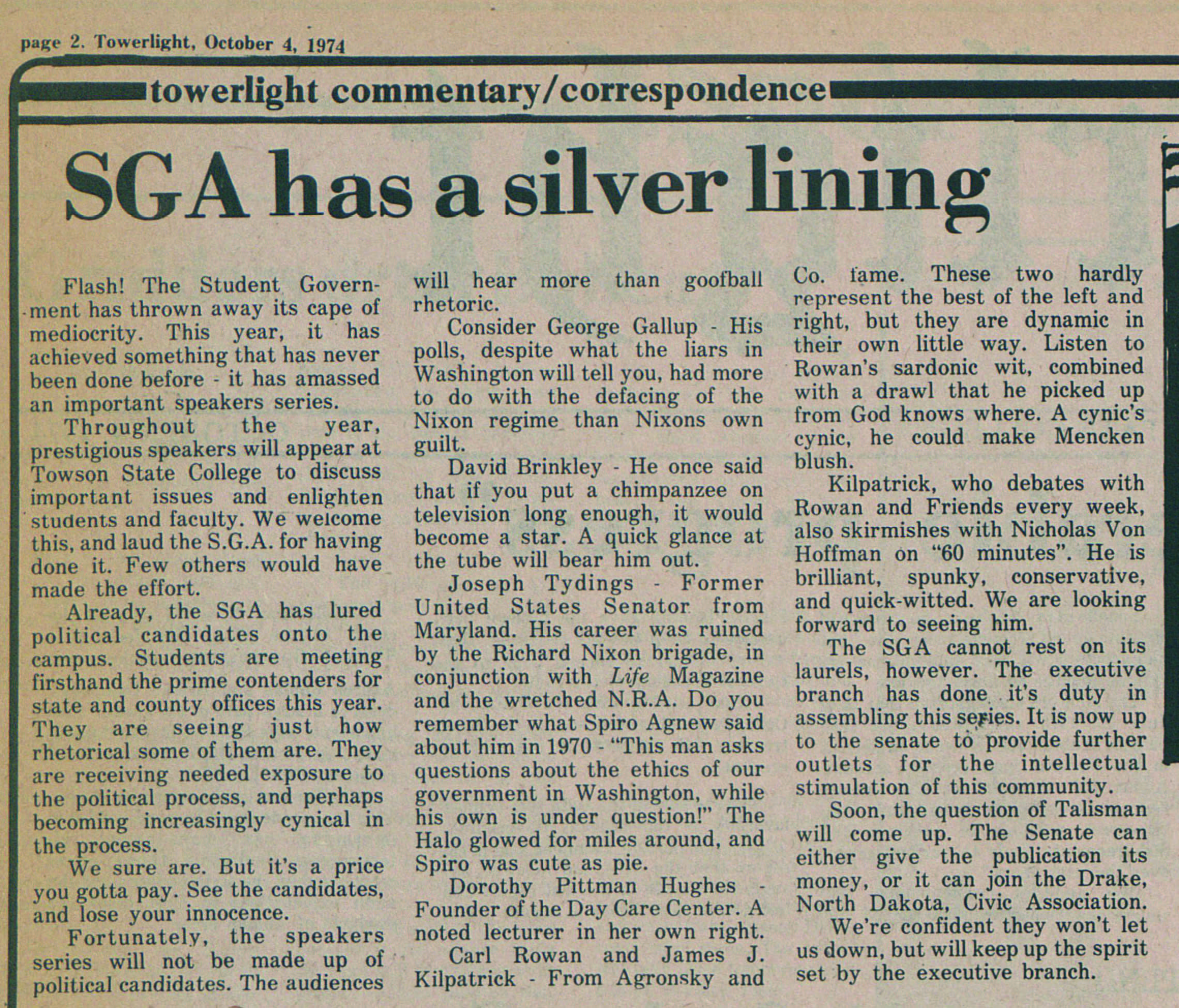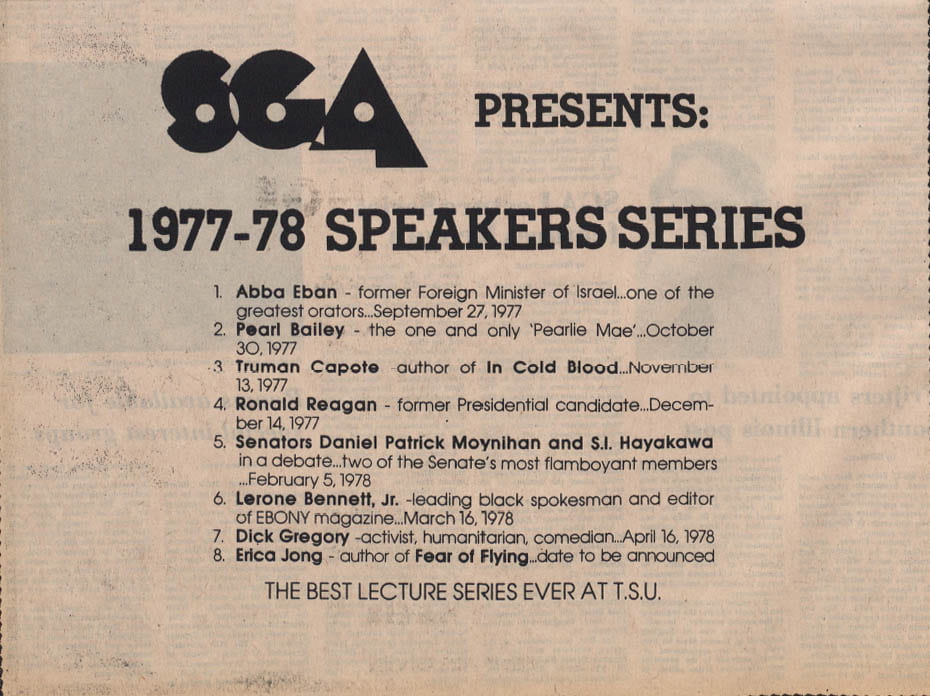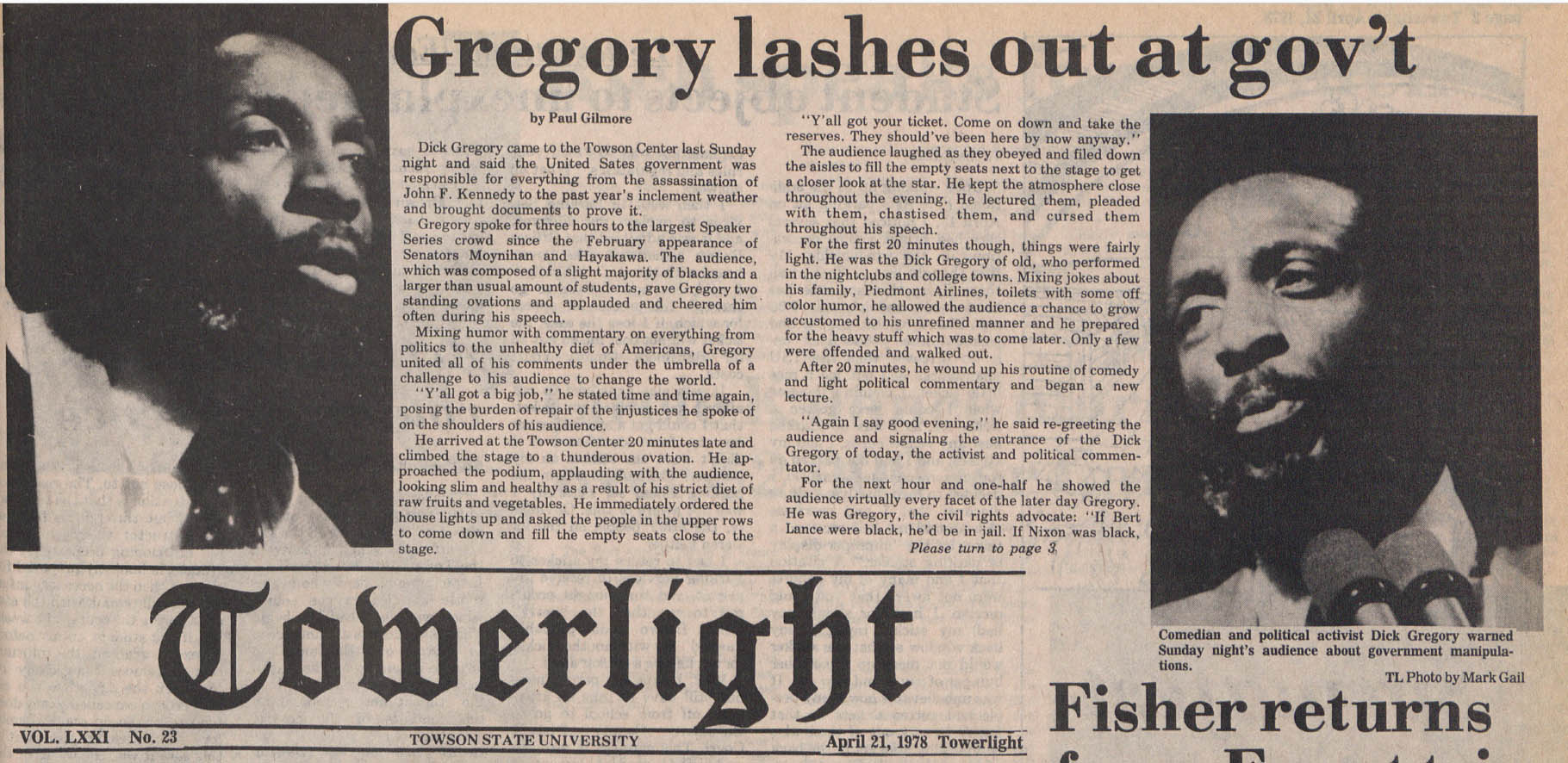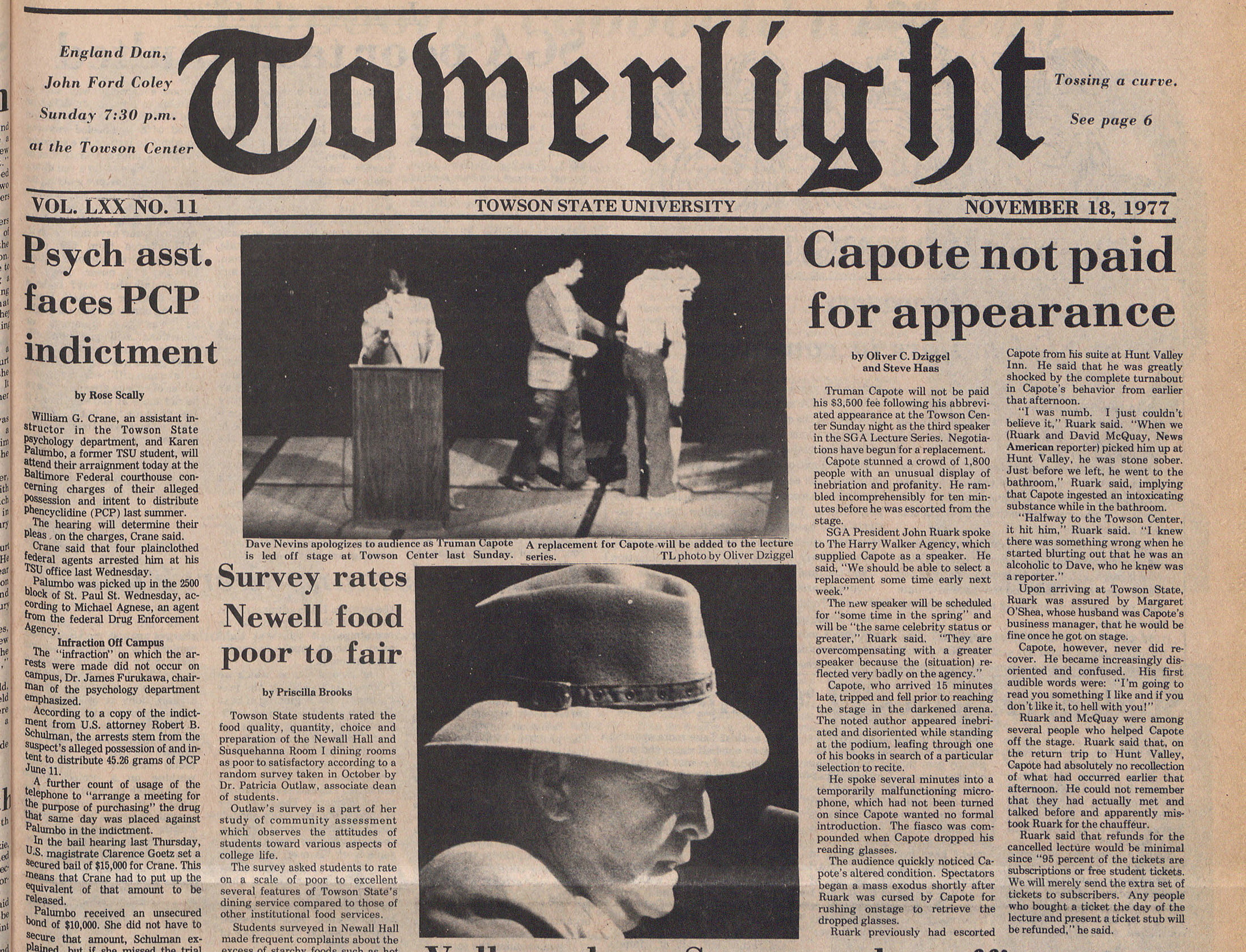At the start of the fall semester in 1974, two women came to campus to speak to community members. One was a member of the Baltimore City Council, who was in the running for a seat on the U.S. Senate. And the other was Gloria Steinem, who was already a well-known feminist activist and co-founder of Ms. magazine.
Steinem introduced Barbara Mikulski to about 800 people attending the campaign appearance, and while Mikulski didn’t win the Senate seat that year, two years later she was elected to the U.S. House of Representatives, and went on to become a US Senator in 1986. She served in this position until January of 2017.

While the event was sponsored by the Towson State College Student Government Association, Mikulski and Steinem were not part of the Student Government Association’s new initiative in 1974, the “Celebrity Speaker Series”.
According to SGA documents, the speaker series was begun “to help make some impact on the academic influence on Towson State campus and with the Towson community at large, other than the normally sponsored programs for students (such as rock concerts).”
That first year, $5,000 was allocated by the SGA to pay for expenses like speaker fees and advertising costs. It was decided that while students and faculty would be able to attend the speeches for free, the public would have to pay for tickets, and a subscription plan was offered to any member of the public who wanted to attend all of the lectures.
Towson’s proximity to DC helped make it an attractive venue for speakers who ranged from journalists to advocates to politicians, both from the US and abroad. By October, the list of speakers was out and the Towerlight, often a critical voice about the activities of the SGA, offered some praise for the program.

Not mentioned in the article are the other four speakers that came to Towson that year — journalist Nancy Dickerson, California congressman “Pete” McCloskey, Israeli politician and diplomat Abba Eban, and politician Bella Abzug. Abzug had worked with Steinem and others to create the National Women’s Political Caucus.
The response to this year of speakers was positive and ticket sales and subscription plans covered over half of the cost of the speakers. Around 400 subscription tickets were sold that year, which meant that the SGA was more willing to budget money for future speakers.
The 1975/1976 series was given $8,000 and featured more controversial and well-known figures. Among the speakers that year were:
- Masters and Johnson who were sexuality researchers who studied not just how humans engage in sex but also how best to diagnose and treat sexual disorders. While the work was eye-opening in terms of cultural perceptions about sex, there were criticisms about whether the laboratory was the best way to understand human sexuality. And at a time when homosexuality was becoming more widely accepted, the institute that bore their name was engaged in conversion therapy, with Masters making claims about the success rate that Johnson didn’t fully believe.
- Margaret Mead who was an anthropologist who also studied sexuality and her work helped influence America’s sexual revolution which began in the 1960s.
- Isaac Asimov who taught biochemistry but was better known for his writing, specifically his science fiction writing.
However, one of the most controversial speakers that year was Nguyen Cao Ky. Ky had been a leader in the military junta that ruled South Vietnam during the Vietnam War. With backing from the United States, he became prime minister in 1963 after ending a series of coups. However, his bombastic style of leadership made his allies nervous. In 1967 South Vietnam held a presidential election but it was far from a democratic process and in reality, a military committee remained in power. Ky became Vice-President while one of his chief rivals acted as President and exiled most of his political opponents, and Ky eventually dropped out of politics.
After the fall of Saigon in April of 1975, Ky fled to the United States.
In December of 1975, Ky came to campus amid boisterous protests.

The protesters first attempted to keep Ky from being paid, and when that was unsuccessful, they tried to keep people from attending and also disrupted the speech itself by shouting questions at Ky, chanting, and pounding on the auditorium doors of Stephens Hall. Ky was surrounded by twelve guards who were positioned both on and off the stage as he spoke, and bomb-sniffing dogs had cleared the area hours before the speech began.
The rest of the speeches that year were, in comparison, non-controversial and calm.
The 1976-1977 series included former CIA director William Colby, journalists Catherine Mackin and Jack Anderson, and Olympian Caitlyn Jenner, who was then known as Bruce Jenner. Jenner had won a gold medal in the 1976 summer Olympics for the decathlon and set a record that remained in place for 20 years. Jenner was on campus 6 months after performing this feat.
Also speaking that year was Timothy Leary, listed on the announcement in the Towerlight as “psychedelic revolutionary, psychologist and educator.” President Richard Nixon had called Leary “the most dangerous man in America” because of Leary’s experimentation with psychedelic drugs. In 1970, he was sentenced to 20 years in prison for possession of marijuana — 10 years for an arrest in 1965 and 10 more for an arrest in 1968. He escaped from a low-security prison in September of that year and fled to Europe where he remained until being arrested by an agent from the US Department of Justice and flown back to the US in 1972. He was sentenced to serve in solitary confinement at Folsom Prison and his cell was next to Charles Manson‘s.
California Governor Jerry Brown had Leary released in April of 1976 and 6 months later, he was on Towson’s campus “urging students to join space migration”.
He began his speech with the words, “Many of you will begin to mutate this evening . . .”
By 1977/1978, the SGA allocation meant even bigger names could be brought in and the series

Ronald Reagan spoke just before the end of the semester, so unfortunately the Towerlight did not include a follow-up article about the soon-to-be President’s speech that year. He had run two unsuccessful Presidential campaigns for the 1968 and 1976 elections, which is why he was listed as “former Presidential candidate” in the announcement the following year. He would go on to win the Presidency in 1980 and serve for 8 years in office.
On the opposite end of the political spectrum was Dick Gregory, who spoke for three hours in the spring of 1978.
He immediately ordered the house lights up and asked the people in the upper rows to come down and fill the empty seats close to the stage.
“Y’all got your ticket. Come on down and take the reserves. They should’ve been here by now anyway.”
While keeping true to his comic origins, Gregory also called out the systemic racism of America and criticized US military campaigns and the US government in general.

But perhaps the most memorable of all the speeches that year, and maybe any year that the SGA Speaker Series was in place, was the night Truman Capote took the stage.
Best known for his works In Cold Blood and Breakfast at Tiffany’s, Capote was already infamous for his use of drugs and alcohol and often showed up to events under the influence.
His night at Towson was no different.
By the time he reached the podium, he was inebriated beyond the point of coherence. As the Towerlight reports, “His first audible words were: ‘I’m going to read you something I like and if you don’t like it, to hell with you!'”
Instead, Capote was helped off the stage and not paid the $3,500 speaking fee.

While the speakers for the 1978/1979 year were well-known — Mike Wallace and Jim McKay and Paul Harvey, to name a few — they were safer bets than had been on the stage in years past.
In fact, the series for the rest of its tenure continued to host mostly politicos and journalists. While these speeches were informative and probably engaging, they didn’t create the same kind of outcry or shock as the Ky or Capote speeches.
Still, when looking through the names that appeared at Towson thanks to the SGA Speaker Series, it is kind of amazing who came to Towson for the 17 years the series was in place.
A Complete List of SGA Speakers, 1974-1991
1974/1975
- Dorothy Pittman Hughes
- Nancy Dickerson
- Bella Abzug
- Abba Eban
- Carl Rowan
- David Brinkley
- George Gallup
- James Kilpatrick
- Joseph Tydings
- Paul McCloskey
1975/1976
- Moshe Dayan
- F. Lee Bailey
- Cmdr. Lloyd Bucher
- William H. Masters and Virginia E. Johnson
- Nguyen Cao Ky
- Margaret Mead
- Isaac Asimov
1976/1977
- William Colby
- Timothy Leary
- Catherine Mackin
- Caitlyn Jenner
- Jack Anderson
- John Holt
- Ralph Abernathy
- Ralph Nader
1977/1978
- Abba Eban
- Pearl Bailey
- Truman Capote
- Ronald Reagan
- Patrick Moynihan and S.I. Hayakawa
- Lerone Bennett Jr.
- Dick Gregory
- Shirley Chisholm
- Dick Clark
1978/1979
- Mike Wallace
- Clarence Kelly
- Jim McKay
- Paul Harvey
- Chaim Potak
- Art Buchwald
- Carl Rowan
- Phyllis Schlafly and Karen DeCrow
1979/1980
- Jane Fonda and Tom Hayden
- Julian Bond
- William Proxmire
- Thomas Szasz
- F. Lee Bailey
- Marlo Thomas
- William F. Buckley Jr.
1980/1981
- Coretta Scott King and Maynard Jackson
- Moshe Dayan
- John Dean and Jack Anderson
- David Brinkley and Howard K. Smith
1982/1983
1983/1984 – canceled after 2 speakers
- Clinton Case
- Ralph Schoenstein
1984/1985
- Eleanor Smeal and Judith Lindahl
- Art Buchwald
- Alan Dershowitz
- William F. Buckley Jr. and George McGovern
- Maya Angelou
- Timothy Leary
- Brooks Robinson
- Orlando Bolanos
- Rosalynn Carter
- George F. Will
- Stansfield Turner
1986/1987
- Jeane Kirkpatrick
- Mark Russell
- Robert Fernandez & Kevin Moeketsi Quhoboshiane — Nicaraguan and South African student leaders on talking tour
- Richard Cohen
1987/1988
- Mark McCormack
- Thomas Szasz and Loren Roth
- Alan Dershowitz
- Helen Thomas
- George F. Will
- Arthur M. Schlesinger, Jr.
1988/1989
1989/1990
1990/1991